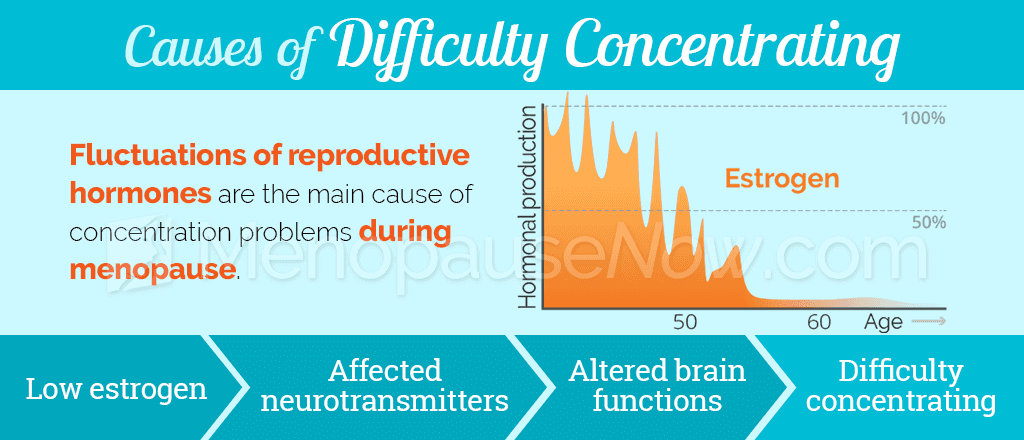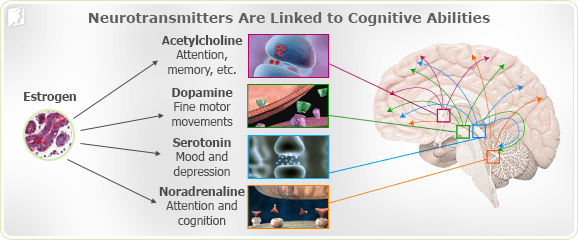Research
Up to two-thirds of menopausal women reported difficulty concentrating on day-to-day tasks in a recent study.
For those women who are experiencing difficulty concentrating as a result of menopause, this symptom can often be confusing, even unsettling. Lapses in concentration may leave a woman feeling as though she is losing control of her mind. There is a variety of reasons why a woman may experience difficulties concentrating, but for women of menopausal age, hormonal fluctuations are likely the reason. Other menopause symptoms can also lead to problems concentrating, and in some cases, other factors may be at work.
Read further to learn more about the various causes of difficulty concentrating.

Hormonal Causes
While a number of factors may trigger difficulty concentrating, hormone fluctuations are typically the primary reason during menopause. Estrogen in particular plays a key role in the function of the brain for multiple reasons.
There are several neurotransmitters in the brain that influence cognitive function, including memory and ability to concentrate. Acetylcholine, serotonin, and dopamine, and noradrenaline have all been shown to regulate cognitive abilities. If there is a shortage in these neurotransmitters, there may be a decrease in cognitive function, leading to difficulty concentrating.
Estrogen affects the production of all of these neurotransmitters. When estrogen levels fluctuate during menopause, so does the production levels of these important neurotransmitters.
Estrogen also affects short-term verbal memory as well as motor skills and spatial ability. The overall result of this decrease in estrogen that comes along with menopause is that women experiences cognitive interference, including difficulty concentrating.

Keep reading to learn more about other potential causes behind this troubling symptom, including other menopause symptoms that may have an effect, as well as risk factors that can aggravate the situation.
Other Menopause Symptoms That Cause Difficulty Concentrating
Related Menopause Symptoms
- Sleep disorders
- Fatigue
- Depression
- Anxiety
- Muscle and joint pain
- Hot flashes
Along with the primary hormonal causes behind difficulty concentrating, many women may have concentration issues because of other menopause symptoms. Sleep disorders, night sweats, and fatigue can render a woman too exhausted to concentrate properly on daily tasks. Psychological symptoms such as depression, anxiety, and panic disorders can also have a role in difficulty concentrating. When a woman is under stress, she may not be able to focus to her best abilities.
Besides these menopausal factors, there may be other risk factors that can make a woman more susceptible to difficulty concentrating. Keep reading to learn more about these other potential causes.
Other Factors That Lead to Difficulty Concentrating
The main cause of difficulty concentrating is attributed to the estrogen fluctuations that influence neurotransmitter levels in the brain, but there are many other factors that can influence a woman's concentration levels. This is not including the other menopause symptoms listed above.

- Natural aging
- Hyperactivity disorders
- Drug use
- Poor nutrition
- Neurological disorders
For those experiencing difficulty concentrating due to any combination of the factors listed above, there are many treatment options available. Read on to learn more about ways to overcome difficulty concentrating and get focused again.
Sources
- Greendale, G.A. , Derby, C.A. & Maki, P.M. (2012). Perimenopause and Cognition. Obstetrics and gynecology clinics of North America, 38(3), 519-535. doi: 10.1016/j.ogc.2011.05.007
- Henderson, V.W. (2008). Cognitive Changes after Menopause: Influence of Estrogen. Clinical Obstetrics and Gynecology, 51(3), 614-626. doi: 10.1097/GRF.0b013e318180ba10
- Herbison, A.E. et al. (2000). Oestrogen modulation of noradrenaline neurotransmission. Novartis Foundation Symposium, 230, 74-85, 85-93. Retrieved from http://www.ncbi.nlm.nih.gov/pubmed/10965503
- Jacobs, E. & D'Esposito, M. (2011). Estrogen shapes dopamine-dependent cognitive processes: Implications for women's health. Journal of Neuroscience, 31(14), 5286-5293. doi: 10.1523/JNEUROSCI.6394-10.2011
- Janicki, S.C. & Schupf, N. (2011). Hormonal Influences on Cognition and Risk for Alzheimer Disease. Current Neurology and Neuroscience Reports, 10(5), 359-366. doi: 10.1007/s11910-010-0122-6
- Kulzow, N. et al. (2016). Impact of Omega-3 Fatty Acid Supplementation on Memory Functions in Healthy Older Adults. Journal of Alzheimer's Disease, 51(3), 713-725. doi: 10.3233/JAD-150886
- Matsuda, Y. , Hirano, H. & Watanabe, Y. (2002). Effects of estrogen on acetylcholine release in frontal cortex of female rats: involvement of serotonergic neuronal systems. Brain Research, 937(1-2), 58-65. Retrieved from http://www.ncbi.nlm.nih.gov/pubmed/12020863



